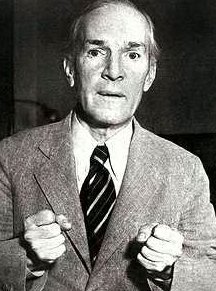Upton Sinclair
| Upton Sinclair | |
|---|---|
 |
|
| Born | Upton Beall Sinclair Jr. September 20, 1878 Baltimore, Maryland, United States |
| Died | November 25, 1968 (aged 90) Bound Brook, New Jersey, United States |
| Occupation | Novelist, writer, journalist, political activist, politician |
| Nationality | American |
| Spouse | Meta Fuller (1902–11) Mary Craig Kimbrough, (1913–61) Mary Elizabeth Willis (1961–67) |
|
|
|
| Signature | |
Upton Beall Sinclair Jr. (September 20, 1878 – November 25, 1968) was an American writer who wrote nearly 100 books and other works in several genres. Sinclair's work was well-known and popular in the first half of the twentieth century, and he won the Pulitzer Prize for Fiction in 1943.
In 1906, Sinclair acquired particular fame for his classic muckraking novel The Jungle, which exposed conditions in the U.S. meat packing industry, causing a public uproar that contributed in part to the passage a few months later of the 1906 Pure Food and Drug Act and the Meat Inspection Act. In 1919, he published The Brass Check, a muckraking exposé of American journalism that publicized the issue of yellow journalism and the limitations of the “free press” in the United States. Four years after publication of The Brass Check, the first code of ethics for journalists was created.Time magazine called him "a man with every gift except humor and silence". He is also well remembered for the line: "It is difficult to get a man to understand something, when his salary depends upon his not understanding it." He used this line in speeches and the book about his campaign for governor as a way to explain why the editors and publishers of the major newspapers in California would not treat seriously his proposals for old age pensions and other progressive reforms.
Many of his novels can be read as historical works. Writing during the Progressive Era, Sinclair describes the world of industrialized America from both the working man's point of view and the industrialist. Novels like King Coal (1917), The Coal War (published posthumously), Oil! (1927) and The Flivver King (1937) describe the working conditions of the coal, oil and auto industries at the time.
...
Wikipedia
